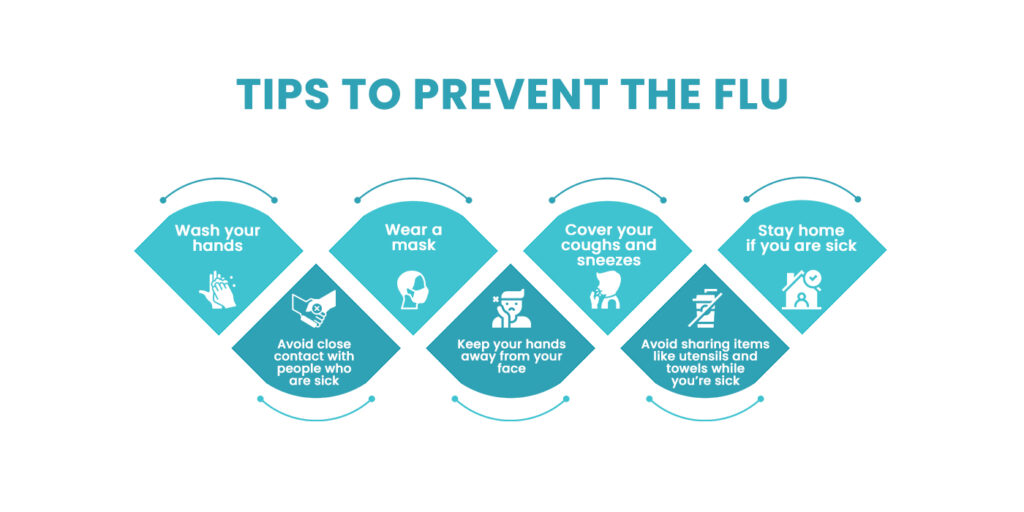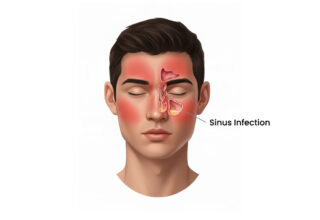Every year, as the weather changes and flu season rolls around, it brings with it a wave of symptoms like stuffy nose and body aches. All of which makes you skip work or school.
But what exactly is the flu? And how is it different from the common cold?
Let’s walk through everything you need to know— from what causes it and how you can prevent it and take care of yourself and your loved ones when it strikes.
What is the Flu?
Flu is a respiratory illness caused by the influenza viruses. It mainly affects the nose, throat, and lungs. Flu often comes on suddenly and brings symptoms like stuffy or runny nose, body aches, and fever. Most people get better without needing any medical treatment. But in some cases it can lead to serious complications and become life-threatening.
What Causes the Flu?
The flu is caused by influenza viruses, which are divided into different types. The common ones are types A, B, and C. The types A and B are the ones we usually see during flu season, and they tend to cause more serious symptoms. Influenza type C, on the other hand, is much milder and doesn’t follow a seasonal pattern— it pops up almost at a steady rate throughout the year.
These viruses are constantly changing, which is why new strains keep appearing often.
How Does the Flu Spread?
The flu spreads mainly through the droplets that are produced when a person with flu sneezes, coughs, or even talks. These droplets can move through the air and land on the mouths or noses of people nearby, or be inhaled into the lungs.
You can also get infected by touching a surface or object that has the flu virus on it, and then touching your mouth, nose, or eyes. These viruses can be present on the surfaces like doorknobs and phones, and can live on them for hours. That’s why hand hygiene is very important during flu season.
Common Symptoms of the Flu:
Flu symptoms usually come on suddenly and can make you feel miserable. Here are some of the most common ones:
- Fever (often high)
- Runny or stuffy nose
- Dry cough
- Sore throat
- Chills and sweats
- Body aches
- Headache
- Fatigue
Flu vs Common Cold: What’s the Difference?
It’s easy to confuse the flu with a cold, since both can have similar symptoms and are viral respiratory infections. However, there are a few differences that can help you differentiate between the two.
|
Flu |
Common Cold |
| Comes on suddenly | Develops gradually |
| Affects more than just your nose and throat | Mainly affects your nose and throat |
| Symptoms can be severe | Symptoms are usually mild |
| Makes you feel exhausted and too sick to do your normal activities | Makes you feel unwell, but usually you can carry on with your usual routine |
Who’s Most at Risk of Flu Complications?
Many people recover from the flu without any problem. But there are some people who are more likely to develop flu-related complications like pneumonia, bronchitis, or worsening of the existing health issues.
These high-risk people include:
- Children, especially under 5 years of age
- Elderly, especially over 65 years of age
- Pregnant women
- People with chronic health issues like asthma, diabetes, or heart disease
- People with weakened immune system (such as from HIV/AIDS, cancer, or immunosuppressive medications)
For these groups, early treatment and prevention is really important.
What You Can Do to Prevent the Flu?
One of the best ways to protect yourself from the flu is to get vaccinated every year. Flu viruses change over time, so it is important to get flu vaccination every year to stay protected against most current strains. The flu vaccine is not perfect and it doesn’t prevent the flu entirely, but it does reduce the risk of severe illness or complications.

Other helpful preventive steps that you can take:
- Wash your hands often with soap and water or use an alcohol based hand sanitiser.
- Avoid close contact with people who are sick.
- Keep your hands away from your face, especially from your eyes, nose, and mouth.
- Stay home if you are sick, or if you have to go out then wear a mask to avoid spreading it to others.
- Cover your coughs and sneezes with a tissue or with your elbow.
- Avoid sharing items like utensils, cups, and towels, while you’re sick.
Managing the Flu at Home:
Most cases of flu can be managed at home with rest, fluids, and over-the-counter (OTC) medications.
Here is how you can take care of yourself or someone else:
- Get plenty of rest.
- Drink a lot of fluids to stay hydrated. Other than water, you can take broths and warm teas that can provide a soothing relief.
- Use fever and pain relieving medicines like acetaminophen or ibuprofen, if needed.
- To soothe sore throat and congestion, you can try warm salt water gargles and steam inhalation.
- For a stuffy or runny nose, you can take oral or spray decongestants like phenylephrine or pseudoephedrine.
- If you’re having a cough, you can take a cough suppressant.
If your symptoms persist or don’t get better, consult with your healthcare provider.
When to See a Doctor:
Contact your doctor if you experience:
- Trouble breathing
- Chest pain
- Dizziness
- Confusion
- Dehydration
- Severe weakness
- Worsening of existing health issues
Final thoughts:
The flu can be tough, but it is usually short-lived with the right care. Knowing how it spreads, what symptoms to watch for, and how to protect yourself and your loved ones, makes a big difference— especially during flu season.
Stay informed, take precautions, and don’t hesitate to rest when your body needs it. And if you’re ever unsure, especially if you are in a high risk group, check with your doctor for best advice.








